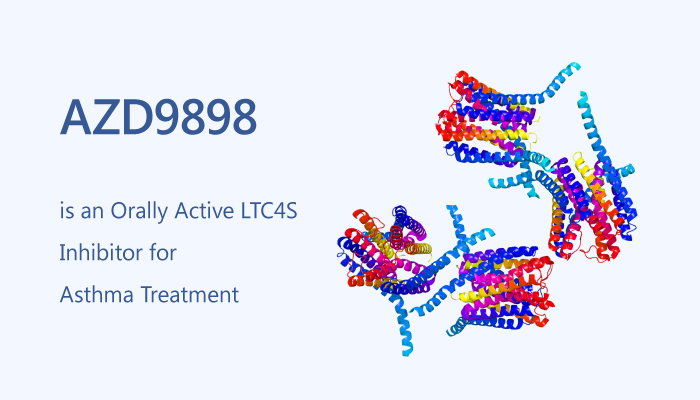The arachidonic acid cascade forms a plethora of proinflammatory and pro-resolution lipid metabolites, including prostaglandins, thromboxanes, and leukotrienes. In particular, the cysteinyl leukotrienes (cysLTs) play an important role in asthma. Cysteinyl leukotrienes LTC4 and LTD4 bind with high affinity to specific receptors. They include various target cells and elicit their well-recognized actions of anaphylaxis, smooth-muscle constriction, and vascular edema. The contribution of all three cysteinyl leukotrienes to the pathology of asthma are the equivocal role of LTB4, the importance of LXA4 to the resolution of inflammation and the emerging role of the proinflammatory toxins. Thus, inhibiting the enzyme LTC4S may be a differentiated point to block the leukotriene cascade. Because it would block the synthesis of LTC4, LTD4, LTE4 and EXC4, EXD4, and EXE4 while preserving LTB4 and proresolution LXA4. In this study, AZD9898 is an oral LTC4S (glutathione S-transferase II) inhibitor. It has an IC50 of 0.28 nM.

AZD9898 is a highly selective LTC4S inhibitor with a low risk for off-target effects. AZD9898 mitigates the GABA binding and hepatic toxicity signal. It also inhibits the formation of CysLTs, while montelukast shows little effect on the production of these metabolites. While inhibiting CysLTs, AZD9898 not only preserves LXA4 but also significantly enhances lipoxin production without shunting the substrate LTA4 toward LTB4 formation. Furthermore, AZD9898 shows a similar regulation of the pathway in healthy blood versus asthmatic blood in vitro.
In summary, the Inhibition of LTC4S enzyme could provide a new and differentiated core treatment for patients with a highly activated cysteinyl leukotriene cascade. AZD9898 is a potent LTC4S inhibitor. Although it is terminated early in phase 1 clinical development, its progress has been instructive.
Reference:
Munck Af Rosenschöld M, et al. J Med Chem. 2019 Aug 30.